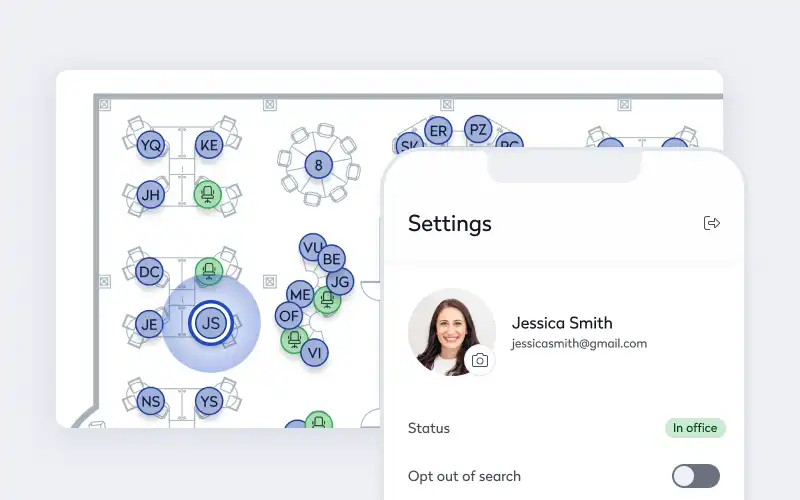
More people are in the office more often, but they’re still coming only on the same three days, intensifying existing challenges for facility and workplace leaders. In fact, across 25 million global users, desk bookings per building grew by 33%, but the majority were still in the middle of the week, creating uneven demand for space and resources, according to the 2025 Workplace Index report.
Organizations can implement AI-backed worktech to directly address these challenges through improved operational efficiencies and data-backed decision-making.
Intelligent worktech’s benefits don’t end there, however. They create opportunities for people across the organization to invest in the human relationships that support larger organizational goals.
How does humanizing the workplace support larger organizational goals and where should companies invest?
The main organizational goals for an enterprise-level company typically include maximizing profitability, ensuring sustainable growth, maintaining a strong market position, enhancing customer satisfaction, fostering innovation, and building a highly engaged and skilled workforce.
Investing in policies and processes that humanize the workplace can help organizations reach these goals by:
- Fostering innovation: A culture that values human interaction can encourage creativity and innovation. When employees feel comfortable sharing ideas and collaborating, the business can benefit from fresh perspectives and solutions, leading to better products and services
- Resolving issues effectively: When problems arise, a human touch can help resolve them more smoothly. Empathetic and personalized communication can de-escalate tensions and lead to better outcomes, ensuring everyone involved feels valued and heard
- Building trust and loyalty: When someone shows genuine care and understanding, people are more likely to trust them, which can lead to stronger retention, repeat business, and positive word-of-mouth recommendations, which are all important for long-term success
Companies can take several steps to humanize the workplace and create a more engaging and supportive environment for their employees. One effective approach is to foster a culture of open communication and transparency. Encouraging regular one-on-one meetings, town hall sessions, and feedback loops can help employees feel heard and valued. Implementing employee recognition programs that celebrate achievements and milestones can boost morale and create a sense of belonging. Companies might also prioritize work-life balance by offering flexible working hours, remote work options, and generous leave policies.
Providing training and development opportunities, such as workshops, seminars, and mentorship programs, can help employees grow both professionally and personally. Creating a supportive and inclusive environment where everyone feels welcome can also enhance the human experience at work. Companies can also implement wellness programs, including mental health support, fitness classes, and stress management resources.
Implementing intelligent worktech can also be an important way for organizations to humanize their workplaces.
In-office days for hybrid departments: Flattening the midweek mountain while creating time for teambuilding
Team days are a strategic approach to hybrid work where managers can control and schedule when their teams come into the office. The feature is part of an integrated workplace management platform and allows managers to set specific days for in-person collaboration and team-building activities. Managers can use it to track attendance and capture insights into team dynamics and productivity, helping them make data-driven decisions.
Managers simply can log into the work management platform and select the days they want their team to be in the office. They can then communicate these days to their team through the platform, which sends automated reminders and updates. Managers can also use the platform to plan team meetings, workshops, and other collaborative activities that are best conducted in person. For example, a manager might schedule Monday and Thursday as in-office days to ensure the team has regular times to work together on complex projects that benefit from in-person brainstorming and feedback sessions.
The ability to control in-office days provides managers with greater flexibility in managing their team’s workflow and productivity. By having designated days for in-person collaboration, managers can ensure that critical tasks and projects are discussed and executed effectively, leading to better team cohesion and a stronger sense of belonging, as employees have regular opportunities to connect and build relationships.
AI-assisted desk booking: Maximizing space utilization while supporting employee connection and collaboration
AI-assisted desk booking optimizes the process of reserving workspaces by providing real-time information on desk availability, preferences, and even proximity to colleagues. Employees can use a user-friendly app or web interface to find and book a desk that suits their needs, whether they require a quiet space for focused work or a collaborative area for team meetings.
Employees can access the desk booking system through their smartphones or computers, where they can see a visual layout of the office and the status of each desk. AI suggests desks based on the employee’s preferences, such as proximity to their team and access to amenities. For example, if an employee needs to work closely with a colleague, the system can recommend desks that are close by.
One of the many benefits of AI-assisted desk booking is the significant reduction in time spent searching for a suitable workspace, helping employees start their day more productively and with less stress. The system also promotes a more flexible and dynamic work environment because employees can easily switch between different types of workspaces based on their tasks and preferences.
The future of facility and workplace management is driven by intelligent tech and focused on people
As companies incorporate more technology into existing and new workflows, it’s important to remember the value of human connection and empathy, explains Christine Mueller, vice president and director of office services, operations, and engineering at Capital Group, in an episode of the Workplace Innovator podcast.
“As much as AI and these other technologies can help support us, there’s always going to be a need for our value, our empathy, our way of supporting the people who work in our spaces,” she says.
In fact, she believes these human elements will become even more important as technology takes over routine tasks.
“We can use AI to help us with some of the day-to-day tasks and reporting, which could save us time to then be spending more time with those we support and talking with them and learning what they need.”






